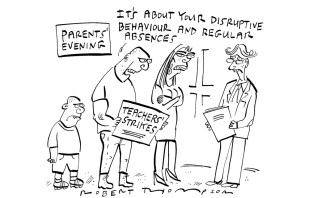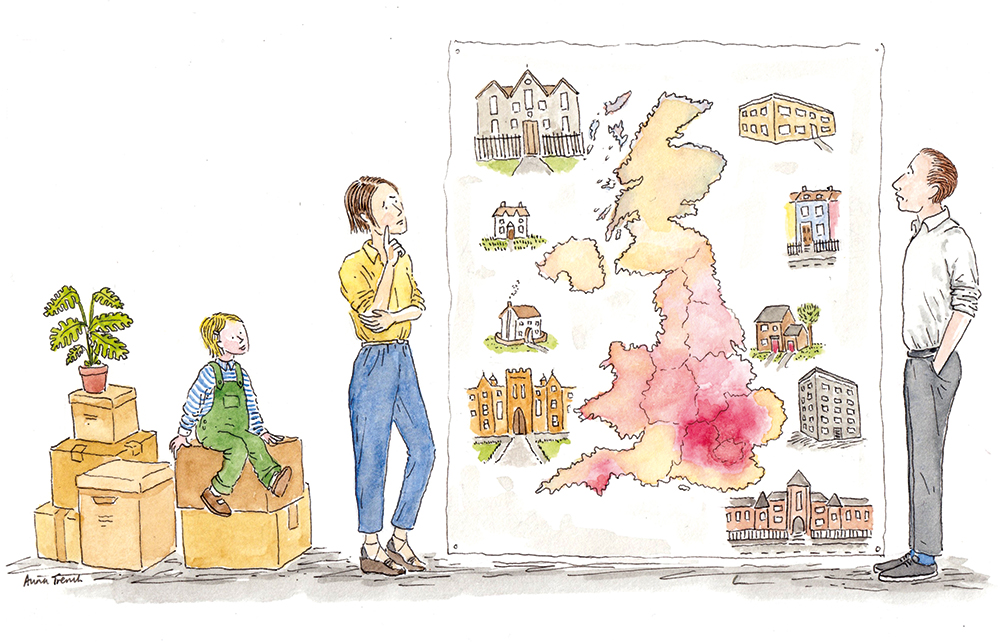Destroying private schools isn’t just a preoccupation of left-wing activists. The former education secretary Michael Gove said in 2019 that he wanted state schools to be so good that paying fees would be seen as an ‘eccentric choice’. Labour has explained that if it wins power, the party will scrap charitable status for private schools and charge VAT on fees. Even among Tory voters, as many people agree with this policy as oppose it.
Is it surprising that support for private schools, including among the middle classes, is on the decline? The cost of private education has more than doubled in 30 years, even accounting for inflation. The average cost of sending a teenager to a private day school is now £16,500 a year and nudging £20,000 in London and the South East.
Mr and Mrs Over-Achiever, a couple in their forties with a salary that puts them in the top 10 per cent, will now need to set aside about a third of their take-home pay to send two children to a private day school. Try doing that while paying a mortgage on a family home. The same school places would have cost the Over-Achievers’ own parents just over £7,250 a year in today’s money and not much more than a sixth of their income.
Curiously, none of this seems to be hitting admissions. More children than ever are being educated outside the state. Privately educated day pupils have made up about 7 per cent of all school-age children for more than a decade, with the number of families buying a private day education creeping up from 410,000 in 2000 to 480,000 last year. Academics have been slow to resolve the paradox. As fees go up, you might expect consumption to fall; but it seems this is not the case. It would be tempting to put the rise down to a huge influx of foreigners buying up places at our top day schools – but that doesn’t appear to be true either.
More likely, the growth in house prices has subsidised fees, as well-off baby-boomer grandparents release money from a smart Home Counties properties to help with the payments. Some parents, too, are releasing equity from their own houses that have shot up in value. Look at a map of where the best private schools are, and unsurprisingly they tend to cover places where house prices are at their heftiest; Britain’s smartest postcodes generally come with a private school nearby.
Researchers recently set about trying to discover what sort of parents send their kids to private school. They found that those with traditional values, a belief in personal responsibility and respect for authority were far more likely to go private. These people want tradition and are willing to pay for it. In fact, a traditional outlook and a commitment to education were stronger predictors of going private than income.
It’s a myth that private school parents are seduced by shiny new facilities. Academic rigour is the most mentioned reason for choosing private education. Such parents want a relentless focus on the basics: reading, writing, maths and science; arts and humanities too. They want their children to learn things and leave school with string of top grades – a not unreasonable aspiration.
Discipline and a strict uniform code were two of the other factors frequently mentioned by parents who picked private schools. If you can’t get a child to tuck their shirt in, there is little hope they will pay attention in class. This might horrify a certain type of trendy educationalist, but these parents are paying precisely in order not to have to listen to trendy views (or have them foisted on their children).
Instead of taxing great schools out of existence, or listening to a hardcore minority of voters who want to ban private education, we should listen to these parents. There would be plenty of them who would be attracted by their local state school if they were run a bit more like a strict private.
Parents like this crave high aspiration. Take South Farnham Primary School in Surrey. A high-performing state primary, and early adopter of academy freedoms, it proudly declares that its mission is ‘the continual pursuit of excellence’. This is exactly the right mindset to tempt parents away from paying for their children’s education and many do move from fancy homes in London to live close to it.
Other state schools are also showing how it can be done. The Fulham Boys School, a free school in central London, aspires to be one of the best in the country – state or private – and is unashamedly no-nonsense about setting high standards for its boys. The headmaster boasts that the institution is committed to ‘firm discipline, academic excellence, a love of sport and an appreciation of the arts’. That’s just the message our traditionally minded private school parents want to hear – and, not surprisingly, the approach works. Fulham Boys is hugely popular with parents, who like what they see.
One of the few meaningful reforms implemented over the past 13 years of Conservative government is a move away from the state controlling every school. Even Labour ministers should jealously protect the freedom of the academies. The term ‘independent’ could now just as accurately apply to a high school down the street as to Eton or Westminster because academies are precisely that – independent.

Parents squeezed by fee increases could easily be enticed to shift their post-tax income from fees to mortgages with the right sort of school at the end of the road. Researchers at the Institute for Fiscal Studies found that proximity to an ‘outstanding’ state school, or a grammar, made it much less likely that parents would opt for a private school.
Any estate agent will tell you that it isn’t a nearby Waitrose which sends house prices shooting up; it’s being inside the catchment area of a brilliant state school. Proper competition with private schools on the things that matter to parents – educational excellence and a commitment to discipline – will only push up standards across the board. Households that find themselves near to one of these independent academies will have the added benefit of a nicely appreciating asset that can be sold on to the next batch of sharp-elbowed parents.
As fees continue to rise, parents seem determined to stick with private schools even if it’s ruinously expensive. That doesn’t mean they can’t be tempted away by a very traditional state education, especially when that would save nearly £20,000 per child. If a future government really wanted to get rid of private schooling, there is a better way to do it than by taxing them out of existence.






Comments